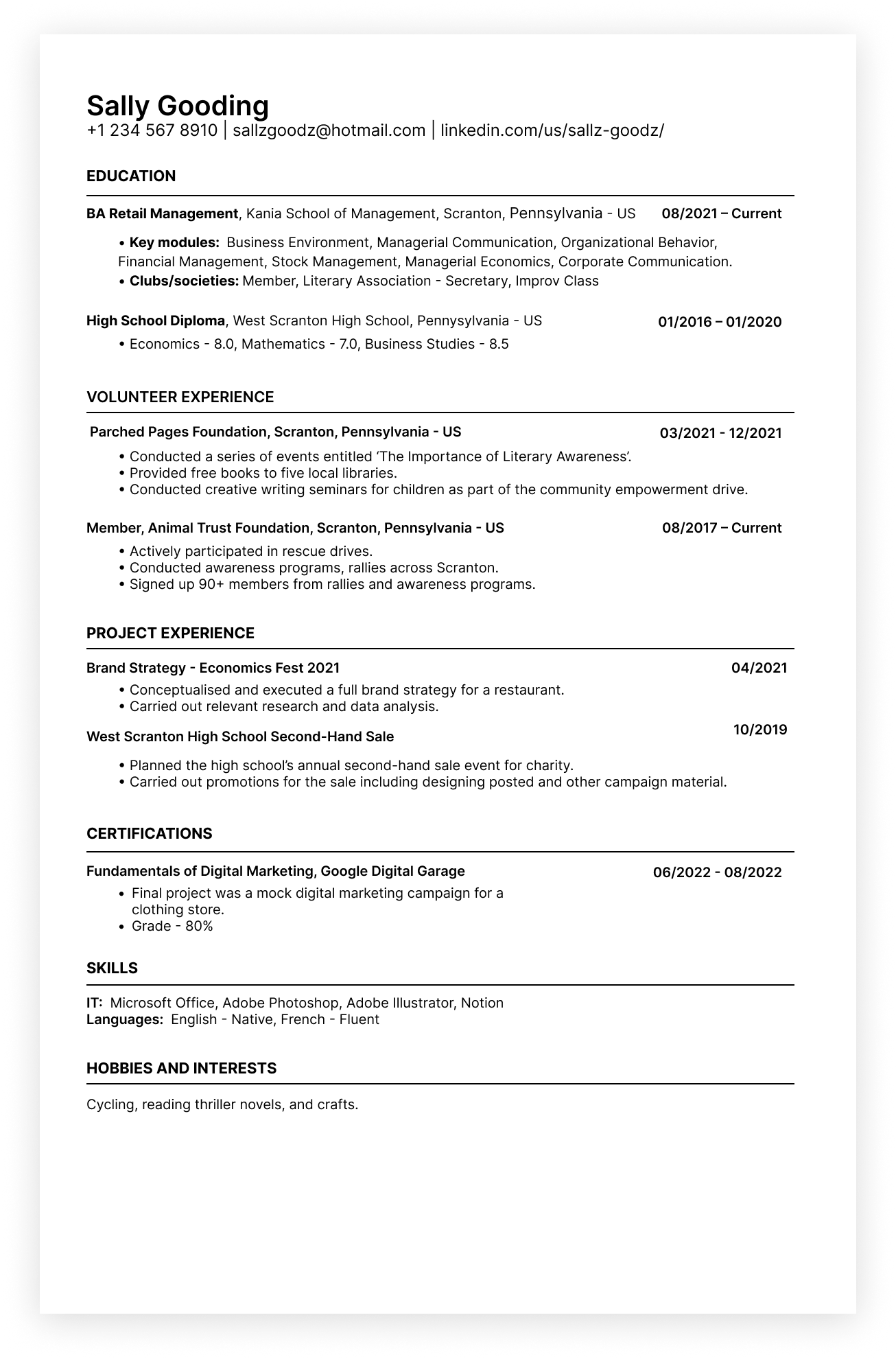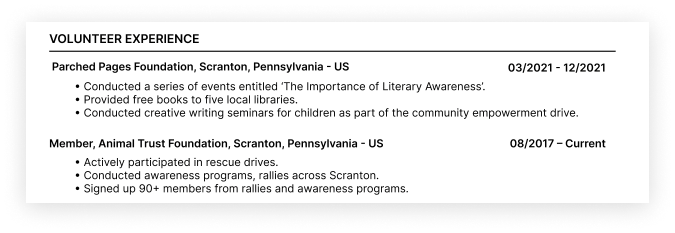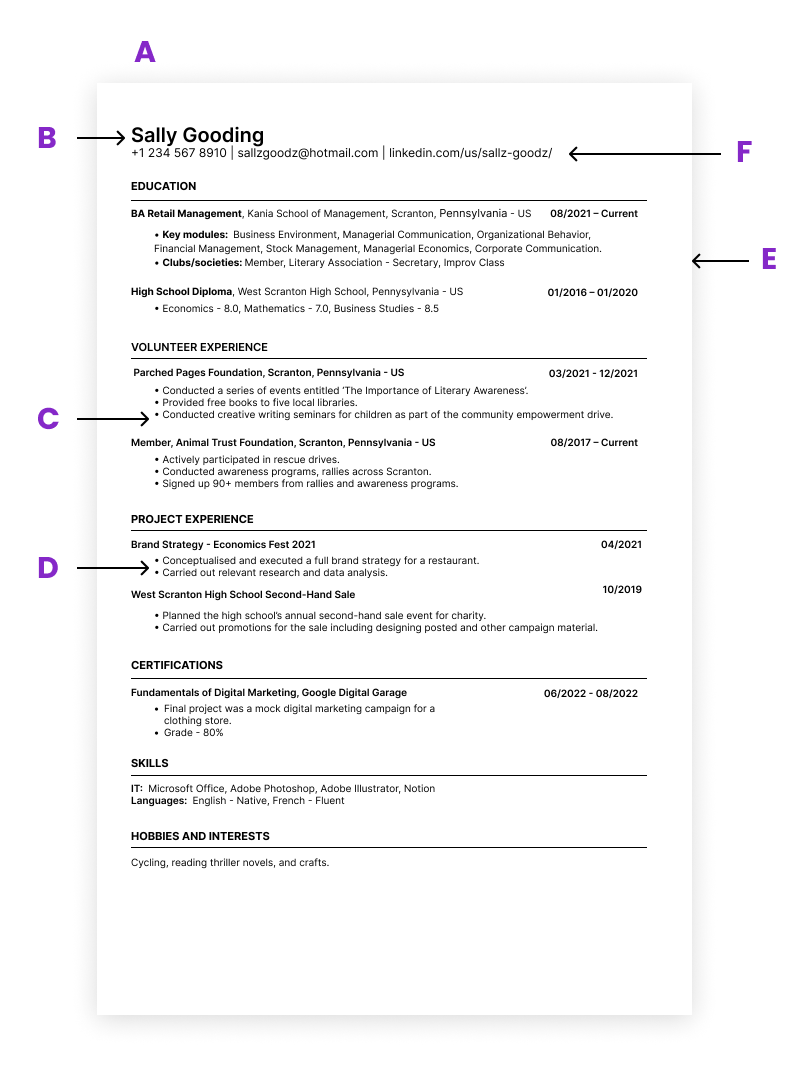
An internship experience is one of the strongest tools in your possession for building a great career. The process of getting an internship itself takes quite a lot of thought and effort, and a big chunk of that goes into your resume. We’re going to show you how to write the perfect resume for an internship, step by step.
The basics
When applying for an internship, there are a few things you need to consider. First things first, most candidates don’t have a lot of work experience to show.
It’s best to treat this as an opportunity to build on your existing skills and interests and accumulate work experience and more professional skills going forward. This means you’ll find more success if you apply for internships that require a skill you already possess.

For example, if you enjoy designing graphics and you’ve taken a few online courses to learn and build on your passion, this could be a handy experience and skill to include in your resume.
Secondly, and most importantly, an internship candidate’s resume is a little different to that of more experienced job applicants.
If you’re looking for an internship, and you don’t have much or any past work experience to help fill up that one full page, what can you do to improve your chances and stand out?
You’ll want to start by nailing down the basics.
The ideal resume for an internship would include the following essentials:
- Your basic details
- Educational background
- Your skills
- Relevant fields/topics of interest
- Past experiences (projects, seminars, workshops)
So, let’s just briefly run through this.
1. At the very top, you would want to include your first and last name, address, contact number and email address. This verifies your identity and gives the other party multiple ways to contact you if they choose to shortlist you.

2. When listing out your educational information, if you’re in college, you’ll start with the name of the college, then the city and state, followed by the graduation date (month and year are sufficient), and finally, the name of the degree. 
3. Now, here’s the trick! In place of work experience, you can use some space to list out activities that are adjacent to it. This would be titled ‘Volunteer Experience and/or ‘Project Experience’, just vast enough to encompass a variety of activities and qualifications that don’t strictly fit under ‘Education’ or the ‘Skills’ section.
For example, if you’ve done volunteer work at a pet shelter in the past, you could list that down on a resume while applying for an internship at a vet clinic. 
If you’ve attended any seminars, online courses or workshops on research and writing, you can include that here when applying for the role of a marketing intern. This will really help buff up your resume.
4. Don’t be afraid to talk about your achievements. If you’ve got a strong GPA, list that down! If you won a trophy at a science fair, add that in! But be careful not to add in irrelevant achievements.
Take for example the internship at a vet clinic. You don’t want to add that you won first place in a pie-eating contest. It’s irrelevant!
5. Your skills need to shine, and we mean SHINE. Most people think, when we say skills, that we mean the technical stuff (like Python, User Interface Design, Photoshop, etc.), but those are just the hard skills.

Soft skills are essential, too. If you’re a good negotiator or have great critical thinking skills, or are artistic, it counts! But you absolutely should avoid simply listing out your soft skills alongside your quantifiable hard skills.
Avoid just stating that you’re a “team player” alongside hard skills like “InDesign”. Work it into your resume. For example, don’t just say you are a “creative thinker”. 
Stating that you were “in charge of brainstorming and executing new concepts for social media campaigns” gives your potential employers an insight into HOW your creative thinking can be leveraged and therefore boosts your chances.
But before we get to the final bit, a quick PSA …
Don’t do this
If this is your first resume (or even your second … or third) there are some things you should DEFINITELY avoid putting in your resume regardless of the reason. Trust us, it’s more trouble than it’s worth.
Avoid doing the following:
- Lying: It’s a risky game you’ve chosen to play by lying in your resume. More often than not, you’re positioning yourself for a tough time and a convoluted web of lies.
Yes, it might seem nice to lie about speaking fluent French in your resume. Hey, what’s the harm? You come off as a language genius and you’ll never have to use French … right?
That is, until you’re suddenly in a meeting with a client whose first language IS French and your boss looks to you to give a good first impression. Now, this might be a little less subtle than most potential scenarios, but you get the idea.
- Adding irrelevant experience and achievements: Listen. We KNOW it’s difficult to be the best at everything and that cherishing every win in life counts, but sometimes, it’s best to let it go.
If you’re looking for an internship at an IT company, please don’t talk about how you have experience dog-walking … and please don’t list “wrangling four canines in a park after they dashed off after a squirrel” under your skills. We’ve seen it all, and it never ends well.
- TMI: When people write out their summaries or hobbies, sometimes, they tend to share a little TOO MUCH INFORMATION. Now, remember, this is a workplace you’re trying to impress. No good will come of telling them about how you scraped your knee in the garden when you were eight, only to find out weeks later that you’d been harboring some vile worm cretin under your skin. And somehow this ties into your interest in microbiology … or something.I mean, sure, that’s interesting, but save it for the chats you’ll have at the office instead. This does NOT belong in your resume.
Now that we’ve got the basics down, let’s move on to how you can put this all “on paper”.
The perfect resume
Here is a example of the perfect resume for internships. You can download the template below.

A. Pick a good template
Your choice of CV template could be your best friend or your worst enemy. Our advice? Stick to a nice, simple but attractive template.
Avoid graphic-heavy templates because if the company happens to use ATS, it could reject your resume before human eyes ever set upon it. Keep it clean, keep it neat and you’ll be strengthening your chances a LOT.
B. Play with the fonts
At this stage in your career, you don’t have a lot going on in terms of experience, so it’s fair to assume your resume will look a little bare. Here’s how playing with fonts can help.
Sometimes, all you need to do is enlarge the header a little. A font setup that takes up more space (discreetly!) will even out your resume quite nicely without anyone suspecting a thing.
C. Use action words
Try to avoid the passive voice when writing your resume. Using action verbs is a more direct and clear way to present information, and it helps you to stand out.
If you’re looking for a useful list of action verbs to strengthen your resume, we’ve got just the thing right here!
D. Match keywords
The tip to a good resume is to customize it for each job role or company you apply for. Look out for the keywords being used in job postings as well as the duties of the role listed so that you can include that strategically in your resume.
You can utilize the same “buzzwords” they’ve used in the job descriptions in your resume to boost your chances of getting noticed.
E. Spell-check
Run your resume through a spell-check because misspelling basic words is a sure-fire way to get yourself rejected.
There might be some companies that are willing to overlook that (or if you’re not applying for a role that requires you to write much, for example, you might get away with it) but it’s helpful to try and get your resume as close to perfection as possible.
F. Link in your LinkedIn
Adding your LinkedIn profile is a great way to solidify yourself as a potential candidate. If you haven’t set up a LinkedIn profile yet, we’ve got a great blog to help you start out and optimize a LinkedIn profile that’ll get you noticed.
Final thoughts
Now that you’ve got a guide on how to write the perfect resume for an internship, you need to do one last thing: Send it in! Send it far and wide and don’t hesitate or hold back just because you feel like you lack one or two skills the recruiters are looking for.
Confidence is really half the game when it comes to job hunting. You’ve got this, we believe in you!
Check out our website for more resources and templates to help you take your career to new heights (or to the world)!



